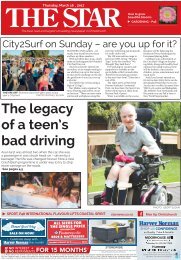117061sm
You also want an ePaper? Increase the reach of your titles
YUMPU automatically turns print PDFs into web optimized ePapers that Google loves.
g<br />
STYLE | wellbeing 53<br />
Sugar –<br />
What’s the Big Deal?<br />
Elly McGuinness takes a look at the sugar debate,<br />
and gives us some realistic advice.<br />
Recipes and nutrition plans centred on sugar-free, low-sugar, or freefrom-refined-sugar<br />
meals and snacks can be found a plenty on the<br />
internet, and in modern cookbooks.<br />
Why move aWay fRom the sWeet stuff?<br />
a diet high in sugar can:<br />
• lead to accelerated tooth decay.<br />
• Be highly addictive, leading your brain and body to want more.<br />
• Cause insulin spikes and troughs which, over time, challenge the<br />
body’s ability to use insulin effectively and increases the risk of type ii<br />
diabetes.<br />
• Cause energy peaks and troughs rather than steady energy<br />
throughout the day.<br />
• lead to excess storage of body fat. sugar that is required for energy<br />
is burned off. after that, the liver and muscles store some. anything<br />
remaining after this is stored as fat.<br />
But don’t I need some?<br />
all carbohydrate foods will eventually be broken down into sugar<br />
inside the body. this includes foods like fruit, vegetables, grains and<br />
legumes. so, if you are eating a balanced diet your body and brain will<br />
be getting plenty of it. it will also be in a more sustaining form, allowing<br />
a gradual release of energy throughout the day, rather than the energy<br />
spikes and troughs experienced with high-sugar foods.<br />
aRe less RefIned optIons BetteR?<br />
Cane sugar, whether it be white or ‘raw’, and even more so ‘high<br />
fructose corn syrup’ (HFCS) are the most refined forms of sugar that<br />
can have the largest negative impact on the body. this is because, in<br />
the refining process, the nutrients have been removed making the end<br />
product a very unnatural thing for the body to deal with.<br />
Unrefined alternatives include honey, fresh dates and pure maple<br />
syrup. these will provide nutrition for the body and will not impact<br />
it in the same way that sugar will. For example, honey has a lower<br />
glycaemic index than sugar, meaning it will release sugar into the body<br />
more slowly. Unrefined alternatives can still result in insulin spikes and<br />
are best consumed alongside other foods that are primarily fat and/or<br />
protein based.<br />
Beware of any sugar alternatives on offer, whether they are natural<br />
sweeteners such as stevia, or claiming to be ‘less refined’, such as<br />
brown rice syrup. Reliance on or craving for any form of sweetener<br />
(even unrefined ones) is a signal to your body that there’s something<br />
missing in your overall nutrition picture.<br />
Practical tips to help you reduce your sugar intake:<br />
• Avoid processed juices and fizzy drinks. Instead, have a couple of<br />
serves of fresh fruit and/or berries which will provide you with a<br />
sweet fix along with fibre and nutrients. Add squeezed lemon or<br />
herbs, such as mint, to fresh water for flavour.<br />
• Significantly reduce packaged and highly processed foods, which<br />
often contain hidden sugars. if you must eat something from a<br />
packet, check for added sugars – anything ending in ‘ose’ (lactose,<br />
glucose, dextrose, sucrose…), and hFCs.<br />
• Dressings and sauces are usually high in sugar. Make your own, so<br />
you know what’s going into them. Balsamic vinegar and olive oil can<br />
make a simple, tasty salad dressing<br />
• select baking recipes with sugar substitutes such as dates, pure maple<br />
syrup (not the stuff with sugar added!) or honey. also ensure there<br />
are protein/fat based foods in the recipes, such as nuts or seeds.<br />
this will lower the glycaemic index of the food and slow down the<br />
release of sugar into your body.















